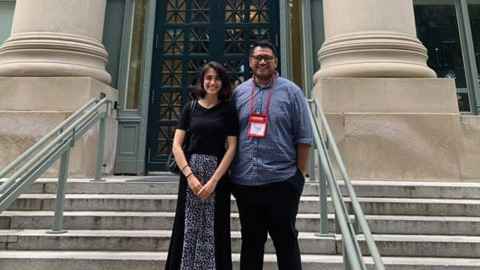Completing Harvard during a pandemic
29 April 2020
While undertaking postgraduate study at Harvard Law School, alumnus Dylan Asafo was forced to return to New Zealand due to the coronavirus global pandemic.

The 26-year-old Fulbright Scholar had been studying for his master of laws when the pandemic arrived in the US.
When Harvard University cancelled all events and closed its campus in March, shifting to remote teaching and learning, Dylan, who was living in student accommodation, had to quickly make alternative plans. Faced with uncertainty as to when campus would reopen, he grabbed a flight and headed back to Auckland.
Despite no longer being physically at Harvard, Dylan says his time studying there has been transformative.
“I expected it to be that way but it’s not until you actually start Harvard, talking with people, connecting with them, that it hits you. I’ve been meeting extraordinary scholars and activists from around the world, who are all passionate about social justice movements, and they want to ensure that lawyers and law students play a role,” he says.
Even with the sudden shift to online learning Dylan says his Harvard experience has been inspiring and the professors are excellent.
Confronting difficult subjects like racism and neocolonialism, and seeing how different countries handle and address those issues, has been overwhelming at times, but also extremely rewarding.
“Confronting difficult subjects like racism and neocolonialism, and seeing how different countries handle and address those issues, has been overwhelming at times, but also extremely rewarding,” he says.
With less than a month of study remaining Dylan is finishing up two main pieces of research.
One is looks at the racial injustices in the law around climate change related displacement in the Pacific. The other compares the hate speech laws of New Zealand and the US.
“A lot of the things I thought were unique to the US are evident in New Zealand as well. Our preoccupation with protecting freedom of speech for example.
"When it comes to debating whether white supremacist content should be given a platform, both New Zealand and the US have found in favour of protecting racist-type speech in the name of political debate in liberal democracy, despite the clear evidence of harms being done by that speech to people of colour and the lack of evidence of a meaningful political debate.
"In light of the terrorist attack in Christchurch last year and the string of other white nationalist attacks in the US it inspired, both jurisdictions need to address and reckon with the real reasons they insist on protecting hate speech against marginalised minorities,” he says.
Despite the interruption to his studies, he says being part of a community comprising students of colour from the US and all over the world, has been a highlight. “It’s the best experience I could have asked for.”
Media queries
Miranda Playfair | Media Adviser
Mob: 021 063 8393
Email: m.playfair@auckland.ac.nz